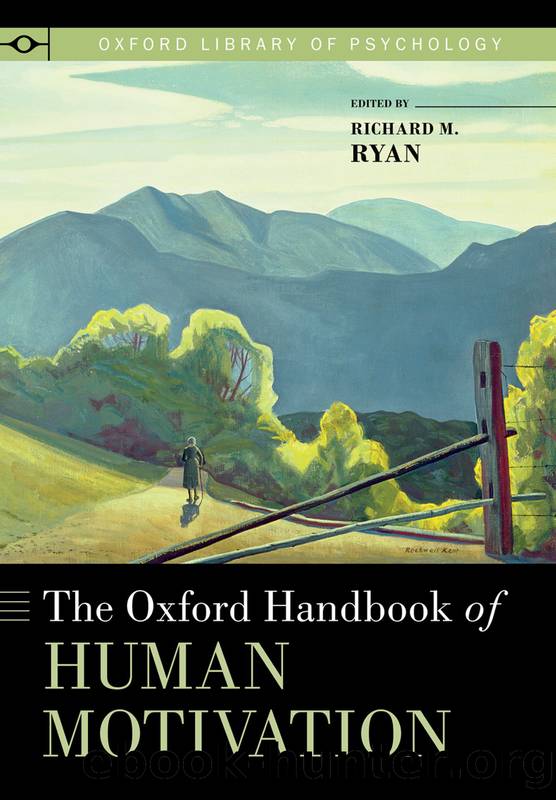The Oxford Handbook of Human Motivation by Richard M. Ryan; & Richard M. Ryan

Author:Richard M. Ryan; & Richard M. Ryan
Language: eng
Format: epub
Publisher: Oxford University Press USA
Published: 2014-01-15T00:00:00+00:00
DOES PROCESS AND OUTCOME GOAL FOCUS CHANGE WITH AGE?
A short-term longitudinal study by Freund, Hennecke, and Riediger (2010) provides first evidence for an age-related shift in primary goal focus. In this study, younger and older exercise beginnersâ process and outcome focus were assessed using an exercise motivation scale. Outcome focus comprised such items as wanting to lose weight, becoming more physically attractive, or improving oneâs appearance in general. Process focus was operationalized as wanting to have fun, socializing with friends, or making new acquaintances. As expected, younger adults focused more on the outcome of their exercise goal, whereas older adults focused more on the process thereof. Moreover, outcome and process focus were differentially associated with goal-relevant exercise outcomes. Adults with a stronger process focus tended to experience a decrease in the distance to their goal over time and rated it as more attainable and important; they also reported higher goal involvement and satisfaction as compared to adults with an outcome focus. One of the shortcomings of this study is that outcome and process focus were assessed indirectly via the motivation to exercise.
Addressing this shortcoming, Freund and Hennecke (in press) demonstrated that a directly assessed process focus helped overweight women to successfully pursue the goal to lose weight over a period of six weeks. Moreover, in another study reported by Freund et al. (2010) presented four goals (e.g., to quit smoking) to younger and older adults. Each goal was described by five process-related statements (e.g., throw away cigarettes) and five outcome-related statements (e.g., improve health). Participants were asked to select five out of these ten statements per goal. As hypothesized, younger but not older adults showed a significant preference for outcome-related descriptors, indicating their stronger outcome orientation. A third study investigated age-related differences in and affective consequences of goal focus. Both younger and older adults were to choose between two âthinking exercises,â one of them focusing on the desired outcomes of personal goals (i.e., outcome-related exercise), the other one focusing on means to pursue these personal goals (i.e., process-related exercise). Participants who selected the process-related exercise then had to list two successive means by which one could pursue the goal of having a good vacation. Participants who selected the outcome-related exercise had to list two successive desired outcomes of having a good vacation (see also Freitas, Gollwitzer, & Trope, 2004). Again, younger adults showed a preference for the outcome-focused exercise, whereas older adults showed no preference for either type. Affect measures were administered after conducting the exercises. A significant age by goal focus interaction indicated that older adults showed higher positive affect after the process-related exercise. Interestingly, younger adults showed more intense negative affect after conducting the outcome-focused exercise, which they had chosen more often. Even though younger adults appear to prefer an outcome focus, then, they experience more negative affect when adopting an outcome rather than a process focus.
Download
This site does not store any files on its server. We only index and link to content provided by other sites. Please contact the content providers to delete copyright contents if any and email us, we'll remove relevant links or contents immediately.
Rewire Your Anxious Brain by Catherine M. Pittman(18214)
Talking to Strangers by Malcolm Gladwell(12798)
The Art of Thinking Clearly by Rolf Dobelli(9813)
Mindhunter: Inside the FBI's Elite Serial Crime Unit by John E. Douglas & Mark Olshaker(8651)
Becoming Supernatural by Dr. Joe Dispenza(7795)
Change Your Questions, Change Your Life by Marilee Adams(7322)
The Road Less Traveled by M. Scott Peck(7234)
Nudge - Improving Decisions about Health, Wealth, and Happiness by Thaler Sunstein(7195)
The Lost Art of Listening by Michael P. Nichols(7106)
Mastermind: How to Think Like Sherlock Holmes by Maria Konnikova(6896)
Enlightenment Now: The Case for Reason, Science, Humanism, and Progress by Steven Pinker(6845)
Win Bigly by Scott Adams(6789)
The Way of Zen by Alan W. Watts(6256)
Daring Greatly by Brene Brown(6191)
Big Magic: Creative Living Beyond Fear by Elizabeth Gilbert(5304)
Grit by Angela Duckworth(5263)
Men In Love by Nancy Friday(4933)
Ego Is the Enemy by Ryan Holiday(4893)
Altered Sensations by David Pantalony(4832)
